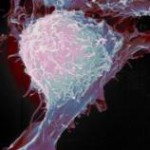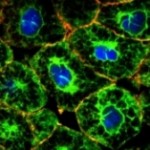 Prostate cancer originates from a rare subpopulation of cells, namely prostate cancer stem cells. Cancer stem cells (CSCs), a small population of cells in the tumor (less than 1%), play a significant role in the development and recurrence of several cancers. These cells have a substantial characteristic of stem cells ability for self-renewal without loss of proliferation capacity with each cell division. Furthermore they are immortal, rather resistant to treatment and express typical markers of stem cells. The origin of these resident CSCs is not clear.
Prostate cancer originates from a rare subpopulation of cells, namely prostate cancer stem cells. Cancer stem cells (CSCs), a small population of cells in the tumor (less than 1%), play a significant role in the development and recurrence of several cancers. These cells have a substantial characteristic of stem cells ability for self-renewal without loss of proliferation capacity with each cell division. Furthermore they are immortal, rather resistant to treatment and express typical markers of stem cells. The origin of these resident CSCs is not clear.
Conventional therapies for prostate cancer are believed to mainly target the majority of differentiated tumor cells but left these CSCs untouched. It causes relapses in the cancer by producing new chemo-resistant cancer cells. If the patient’s cancer comes back within the 5 years of remission, it is considered a relapse. Therefore, successful elimination of CSCs is an effective strategy to achieve complete remission from this disease. Killing the CSCs is obviously a priority.
Prostate CSCs are a subpopulation of CD44+ cells within the tumor that give rise to differentiated tumor cells and also self-renew. The following study shows that these cancer specific stem cells are pro-inflammatory. The main pathways activated are Wnt/β-catenin, Notch, Hedgehog, EGF-like/EGFR/Neu, LIF, TGF-β, integrins, telomerase, SDF-1/CXCR4, prolactin/growth hormone, the IGF-1 system,and ER/PR.
Stem cells: The root of prostate cancer?
Prostate cancer stem cells: a new target for therapy.
Revisiting the concept of cancer stem cells in prostate cancer.
Prostate cancer stem cell biology.
Prostate cancer stem cells and their potential roles in metastasis.
Cancer stem cell markers in common cancers – therapeutic implications.
 The WNT signaling pathway plays key roles in regulating the differentiation and pluripotency of stem cells within numerous tissues. Wnt ligands are up-regulated in prostate cancer, and their expression often correlates with aggressiveness and metastasis. There is currently no cure for metastatic prostate cancer.
The WNT signaling pathway plays key roles in regulating the differentiation and pluripotency of stem cells within numerous tissues. Wnt ligands are up-regulated in prostate cancer, and their expression often correlates with aggressiveness and metastasis. There is currently no cure for metastatic prostate cancer.
Wnt ligands are a family of secreted glycoproteins. There are 19 different Wnt members. They exist on the outer membrane of cells. When stimulated, it activates a protein called β-catenin that migrates into the nucleus. Once β-catenin enters the nucleus, it interacts with a variety of nuclear factors to control specific transcriptional targets. Over expression of the WNT/β-catenin pathway is very common in cancers of all types, including colorectal cancer, prostate cancer and melanoma.
Wnt/β-catenin signaling is important for the proliferation of CSCs. Inhibition of Wnt/β-catenin signaling is therefore a promising treatment approach. In addition, WNT/β-catenin associates with the androgen receptor, a key regulator of prostate growth that drives prostate cancer progression.
Roles and regulation of Wnt signaling and beta-catenin in prostate cancer.
Wnt/β-catenin signalling in prostate cancer.
Activation of β-catenin signaling in androgen receptor-negative prostate cancer cells.
The scientists have found that gamma-tocotrienol is potent in killing prostate cancer stem cells. Gamma-tocotrienol is one of eight forms of vitamin E, which have been shown to have anticancer effects against a wide range of human cancers. There are two classes of components in Vitamin E: tocopherols (alpha, beta, gamma, delta) and tocotrienols (alpha, beta, gamma, delta)—each class with four distinct compounds (total of eight).
This study aimed to find a way to eradicate prostate cancer stem cells. It follows an earlier report that demonstrated the effectiveness of gamma-tocotrienol in targeting the bulk of the prostate tumour mass. The scientists found that low doses of gamma-tocotrienol cause apoptosis in the prostate CSCs and suppress their colony formation capability. This results in a lower prostate CSC population (as defined by the protein markers CD44 and CD133).
Further tests in mice models were conducted, where mice implanted with hormonal refractory prostate cancer cells were given gamma-tocotrienol orally. The results showed that gamma- tocotrienol not only reduced tumour size formed, but also decreased the incidence rate of tumour formation by 75%, as compared to the control group of mice, which had 100% tumour formation. These results strongly suggest that gamma-tocotrienol could be developed for prostate cancer prevention and treatment. This finding highlights the considerable potential of gamma-tocotrienol as a natural remedy to prevent and treat prostate cancer. We believe that the gamma-tocotrienol’s capability of killing prostate CSCs comes through its capability to modulate Wnt/β-catenin signaling pathway.
Gamma-tocotrienol as an effective agent in targeting prostate cancer stem cell-like population.
Tocotrienol as a potential anticancer agent.
In addition, gamma-tocotrienol suppresses prostate cancer cell proliferation and invasion through multiple mechanisms.
Gamma-tocotrienol metabolism and antiproliferative effect in prostate cancer cells.
γ-Tocotrienol induces growth arrest through a novel pathway with TGFβ2 in prostate cancer.
Gamma-tocotrienol is derived naturally from palm oil. Especially, unrefined organic red palm oil is one of the richest plant sources of cancer fighting gamma-tocotrienol. Red-PalmZym is naturally fermented organic virgin red palm oil. Red-PalmZym contains the purest, most highly bioavailable cancer fighting gamma-tocotrienol.
Red-PalmZym can be used as a dietary supplement to provide a natural source of mixed vitamin E, mixed carotenoids, vitamin K, CoQ10, squalene, phytosterols, and other nutrients.
Natural Red Palm Oil (high in saturated fat) kills Cancer Cells
The fermented red palm oil miracle
Silibinin and curcumin also inhibit Wnt/β-catenin signaling pathway.